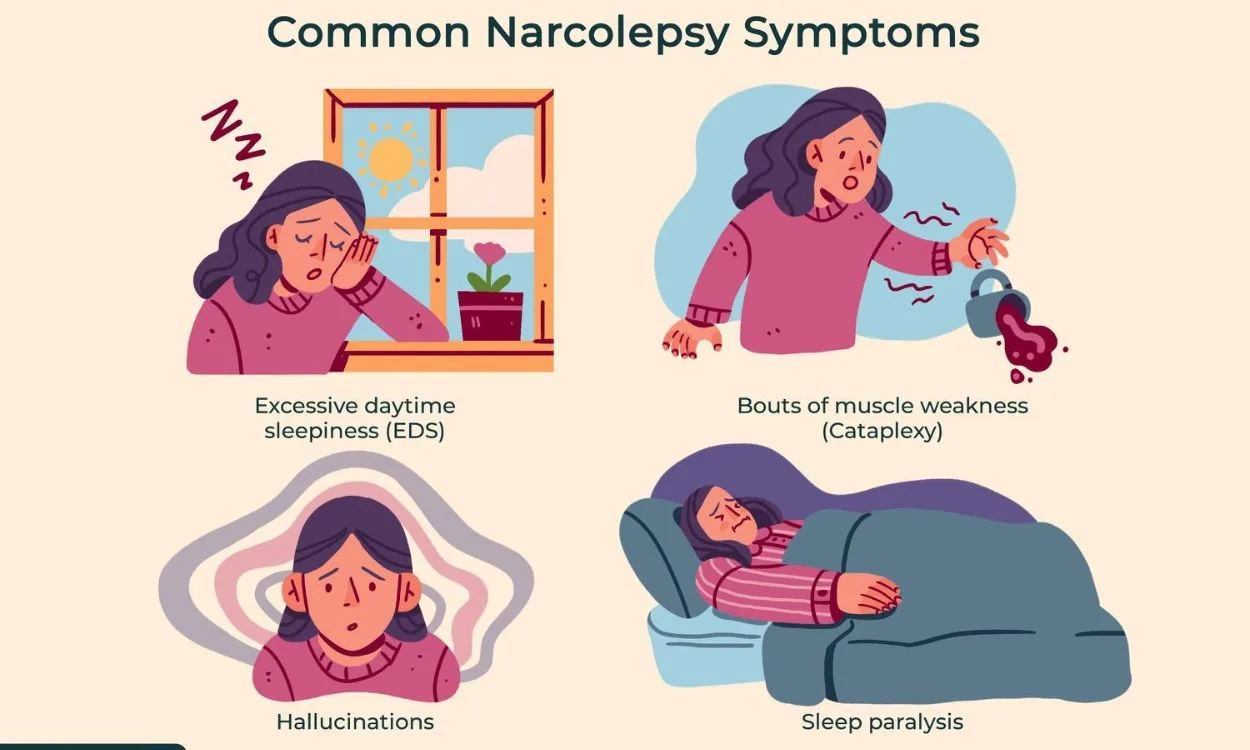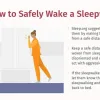What are the signs and symptoms of narcolepsy?
Narcolepsy is a neurological disorder that affects the brain’s ability to regulate sleep-wake cycles. It is characterized by excessive daytime sleepiness and sudden attacks of sleep. This condition can significantly impact a person’s daily life, making it important to recognize the signs and symptoms of narcolepsy.
Here are the key indicators to watch out for:
- Excessive daytime sleepiness (EDS): One of the hallmark symptoms of narcolepsy is an overwhelming and persistent feeling of sleepiness during the day, regardless of how much sleep the individual gets at night. This excessive sleepiness can interfere with daily activities and lead to difficulties in staying awake and alert.
- Sudden loss of muscle tone (cataplexy): Cataplexy is a sudden and temporary loss of voluntary muscle control and tone, often triggered by emotional experiences such as laughter, excitement, or anger. It can range from mild muscle weakness, such as drooping of the eyelids, to complete collapse. Episodes typically last for a few seconds to a few minutes and are usually not associated with loss of consciousness.
- Sleep paralysis: Sleep paralysis is the temporary inability to move or speak while falling asleep or waking up. People with narcolepsy may experience episodes of sleep paralysis, which can be accompanied by vivid hallucinations and a sense of fear or unease.
- Hypnagogic hallucinations: These are vivid and often disturbing hallucinations that occur during the transition from wakefulness to sleep. People with narcolepsy may see, hear, or feel things that are not really there, such as seeing people or animals in the room or hearing voices.
- Fragmented nighttime sleep: Despite feeling excessively sleepy during the day, individuals with narcolepsy often have difficulty maintaining a continuous and restful sleep at night. They may experience frequent awakenings, have vivid dreams, and may exhibit abnormal rapid eye movement (REM) sleep patterns.
- Automatic behaviors: Narcolepsy can cause individuals to engage in routine activities or tasks automatically without conscious awareness or memory. This can include actions such as driving or cooking, which can be potentially dangerous.
It is important to note that not all individuals with narcolepsy experience all of these symptoms, and their severity can vary from person to person. If you suspect you or someone you know may have narcolepsy, it is crucial to consult a healthcare professional for an accurate diagnosis and appropriate management.
Now that you have a better understanding of the signs and symptoms of narcolepsy, let’s explore how Fitpaa can assist you in managing your health and well-being.
Fitpaa is an AI-driven metabolism monitoring and management technology that aims to help individuals achieve their health and fitness goals. While Fitpaa focuses on overall wellness and not specifically on narcolepsy, it can be a valuable tool in supporting a healthy lifestyle for individuals with narcolepsy. Here’s how Fitpaa can benefit you:
- Metabolism Assessment: Fitpaa offers a comprehensive metabolism assessment to identify the root cause of your health condition. By analyzing your metabolism, Fitpaa can provide insights into how your body processes energy and recommend personalized strategies to optimize your overall well-being.
- Personalized Fitpaa Capsule: After completing your metabolism assessment, Fitpaa prepares a personalized Fitpaa Capsule based on your metabolism, health goals, current lifestyle, and eating habits. This capsule combines medical therapy, exercise therapy, nutrition therapy, and cognitive behavior therapy to optimize your metabolism, help you achieve your health and fitness goals, and strengthen your body and mind.
- Fitpaa Realtime Guidance: Fitpaa’s real-time guidance technology incorporates elements of habit-building, timely nudging, and purpose-finding from cognitive behavioral therapy. It provides continuous support and inspiration throughout the day, helping you stay motivated and take necessary actions to attain desired results. The Fitpaa mobile app serves as a virtual workout trainer, diet tracker, performance tracker, and progress tracker, making it easy to follow your Fitpaa Capsule.
With Fitpaa, you get access to a personal health and fitness team, including a fitness planner, fitness coach, nutritionist, and doctor, who will regularly review your progress and make course corrections as needed. Fitpaa’s commitment to your well-being is evident in its goal-oriented services, which come with a lifetime validity, ensuring that you achieve your health and fitness goals with a 100% guarantee.
In conclusion, recognizing the signs and symptoms of narcolepsy is crucial for timely diagnosis and appropriate management. If you suspect you may have narcolepsy, consult a healthcare professional for a proper evaluation. Additionally, Fitpaa can be a valuable tool in supporting your overall health and well-being, providing personalized guidance and resources to help you achieve your goals. Download the Fitpaa app today and embark on a journey towards a healthier and more fulfilling life.









